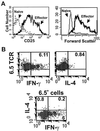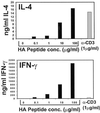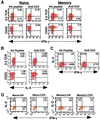Functional plasticity of an antigen-specific memory CD4 T cell population
- PMID: 12192093
- PMCID: PMC129349
- DOI: 10.1073/pnas.192263099
Functional plasticity of an antigen-specific memory CD4 T cell population
Abstract
The protective nature of memory immune responses is attributed largely to terminally differentiated memory T cells that retain memory of the antigen via the antigen receptor and memory of the effector functions that initially cleared the pathogen. It is not known whether a given population of antigen-specific memory T cells is endowed with functional flexibility to provide protective responses against antigens reencountered in different immunological contexts. Here, we examine functional properties of influenza hemagglutinin (HA)-specific memory CD4 T cells recovered from adoptive hosts that received in vitro-activated HA-specific T cell receptor-transgenic CD4 T cells 2 months to 1 year previously. We demonstrate that this HA-specific memory CD4 T cell population bearing a clonal T cell receptor can produce predominantly T helper 1 or T helper 2 effector cytokines depending on the nature of the recall stimulus. Our findings reveal remarkable functional plasticity within an antigen-specific memory T cell population and have direct implications for modulating memory T cell function in vaccine design and treatments for autoimmune diseases.
Figures




References
Publication types
MeSH terms
Substances
Grants and funding
LinkOut - more resources
Full Text Sources
Other Literature Sources
Research Materials

